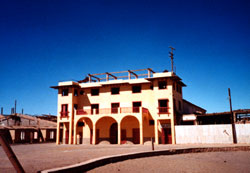
Renovated
theater building at Chacabuco. The Building was renovated in
1992 by the Goethe Institute in Santiago.
Photo Copyright © Joanne Pottlitzer, 1995 |
We
didn’t have a radio, but we had music, the music we made ourselves.
The miners of the María Elena Union sent me a guitar. Later
a quena appeared, then a bombo, until we ended up
with a small orchestra inside the camp that played different kinds
of Latin American music.
There was also intense activity in popular culture. Prisoners who
had been manual laborers would ask organizations to provide materials
so that they could continue to work with their hands. Materials
found on site were also used. Jewelry and other crafts were made
out of scrap metal, cloth and pebbles. This form of cultural work
began to occur in all the jails. It was the only form of power there
was to maintain our spirit, maintain a state of mind that belonged
to us and not to those who dominated us -- or who wanted to dominate
us.
At first there was a good deal of opposition to these activities.
In our case -- there were 1,200 of us in the north -- we formed
what we called an "old people’s committee" and selected
a representative to talk to the military authorities. And once they
saw what it was all about, we were able to do our shows. The guards
would even ask our permission to attend. Every Saturday we’d
put on a play by "improvised" playwrights, people who
had never written plays. Every week they’d write a different
script, a play that lasted 40 or 50 minutes. Of course they were
comedies; we couldn’t tell our dramas there. It was all about
keeping the prisoners’ morale and dignity as high as possible.
There were humorous things. When you leave an experience like that
alive, you remember many more positive things than negative. For
example, there was a tiny little man who played the role of Tarzan
in skits because he was the only one who had a leopard-skin print
bikini. And he continued playing the role because he had those bikinis.
Many funny things.
Three or four months after my release, which had been accelerated
by international pressure from artists like Yves Montand, Aznavour,
Joan Baez, I was summoned to appear at the investigation division
of the Political Police. I was told by an official that I had to
leave Chile. There was no official document but it was a very direct
threat. So, at the end of 1974 I went to Mexico, where I lived for
two years before going to Paris.
ROBERTO MARQUEZ, musician, singer, director of Illapu
We were one of the last groups to join the New Chilean Song movement,
at the end of 1970. We recorded our first record, Música
Andina, in 1972 with DICAP, the Communist Youth label, which
opened the door for us to introduce our music at festivals in Santiago.
We’re from the north of Chile and played music from that region,
which was barely known here in Santiago at that time. Many people
from central Chile felt that music didn’t belong to our country
because it sounded more like music from Perú and Bolivia.
They didn’t understand that part of the Andean music corresponds
to northern Chile and Argentina as well.
|
|


